Uncertainty Assessment of Flood Hazard Due to Levee Breaching
Abstract
:1. Introduction
2. Case Study and Numerical Model
2.1. Model Set Up
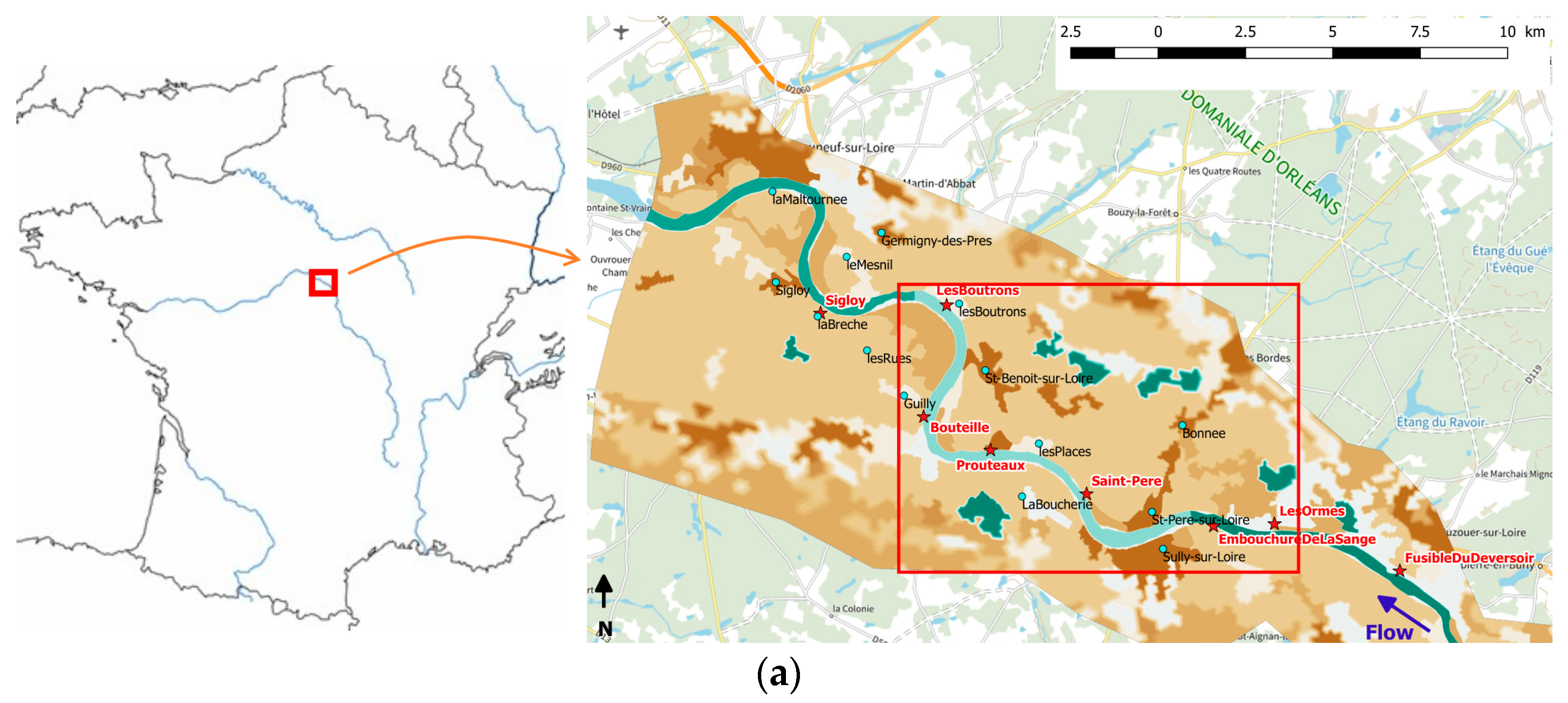

2.2. Hydrodynamic Model
2.2.1. Roughness Coefficient
2.2.2. Levee Breaches
3. Uncertainty Assessment Methodology
3.1. Uncertainty Quantification
3.1.1. Flood Inundation Scenarios
3.1.2. Uncertain Parameter Characterization
- Roughness coefficient quantification:
- Dike breach controlling coefficient quantification:
3.2. Uncertainty Propagation
3.3. Sensitivity Analysis
3.3.1. Permutation Feature Importance
3.3.2. Borgonovo Sensitivity Analysis
4. Results
4.1. Global Statistical Analysis
4.1.1. Uncertainty Propagation
4.1.2. Sensitivity Analysis
4.2. Local Statistical Analysis
4.2.1. Uncertainty Propagation
4.2.2. Sensitivity Analysis
5. Discussion
6. Conclusions and Perspectives
Author Contributions
Funding
Data Availability Statement
Acknowledgments
Conflicts of Interest
References
- European Environment Agency. Available online: https://www.eea.europa.eu/publications/economic-losses-and-fatalities-from/economic-losses-and-fatalities-from (accessed on 10 February 2022).
- Freer, J.; Beven, K.J.; Neal, J.; Schumann, G.; Hall, J.; Bates, P. Flood Risk and Uncertainty. In Risk and Uncertainty Assessment for Natural Hazards; Cambridge University Press: Cambridge, UK, 2013; pp. 190–233. [Google Scholar] [CrossRef] [Green Version]
- Ghazali, D.A.; Guericolas, M.; Thys, F.; Sarasin, F.; Arcos González, P.; Casalino, E. Climate Change Impacts on Disaster and Emergency Medicine Focusing on Mitigation Disruptive Effects: An International Perspective. Int. J. Environ. Res. Public Health 2018, 15, 1379. [Google Scholar] [CrossRef] [Green Version]
- Tabari, H. Climate change impact on flood and extreme precipitation increases with water availability. Sci. Rep. 2020, 10, 13768. [Google Scholar] [CrossRef]
- Rifai, I.; Erpicum, S.; Archambeau, P.; Violeau, D.; Pirotton, M.; El kadi Abderrezzak, K.; Dewals, B. Overtopping induced failure of non-cohesive homogenous dikes. Water Resour. Res. 2017, 53, 3373–3386. [Google Scholar] [CrossRef] [Green Version]
- Özer, I.E.; van Damme, M.; Jonkman, S.N. Towards an International Levee Performance Database (ILPD) and Its Use for Macro-Scale Analysis of Levee Breaches and Failures. Water 2020, 12, 119. [Google Scholar] [CrossRef] [Green Version]
- Akhter, F.; Mazzoleni, M.; Brandimarte, L. Analysis of 220 Years of Floodplain Population Dynamics in the US at Different Spatial Scales. Water 2021, 13, 141. [Google Scholar] [CrossRef]
- FEMA (Federal Emergency Management Agency). Guidance for Flood Risk Analysis and Mapping, Flood Risk Assessments; FEMA: Washington, DC, USA, 2020.
- Ferrari, A.; Dazzi, S.; Vacondio, R.; Mignosa, P. Enhancing the resilience to flooding induced by levee breaches in lowland areas: A methodology based on numerical modelling. Nat. Hazards Earth Syst. Sci. 2020, 20, 59–72. [Google Scholar] [CrossRef] [Green Version]
- Pappenberger, F.; Beven, K.J.; Horritt, M.; Blazkova, S. Uncertainty in the calibration of effective roughness parameters in HEC-RAS using inundation and downstream level observations. J. Hydrol. 2005, 302, 46–69. [Google Scholar] [CrossRef]
- Aronica, G.T.; Franza, F.; Bates, P.D.; Neal, J.C. Probabilistic evaluation of flood hazard in urban areas using monte carlo simulation. Hydrol. Process. 2012, 26, 3962–3972. [Google Scholar] [CrossRef]
- Abily, M.; Delestre, O.; Bertrand, N.; Duluc, C.-M.; Gourbesville, P. High-resolution Modelling With Bi-dimensional Shallow Water Equations Based Codes –High-Resolution Topographic Data Use for Flood Hazard Assessment Over Urban and Industrial Environments. Procedia Eng. 2016, 154, 853–860. [Google Scholar] [CrossRef]
- Vorogushyn, S.; Merz, B.; Lindenschmidt, K.-E.; Apel, H. A new methodology for flood hazard assessment considering dike breaches. Water Resour. Res. 2010, 46, W08541. [Google Scholar] [CrossRef] [Green Version]
- Mazzoleni, M.; Bacchi, B.; Barontini, S.; Di Baldassarre, G.; Pilotti, M.; Ranzi, R. Flooding hazard mapping in floodplain areas affected by piping breaches in the Po River, Italy. J. Hydrol. Eng. 2014, 19, 717–731. [Google Scholar] [CrossRef]
- Mazzoleni, M.; Dottori, F.; Brandimarte, L.; Tekle, S.; Martina, M.L.V. Effects of levee cover strength on flood mapping in the case of levee breach due to overtopping. Hydrol. Sci. J. 2017, 62, 892–910. [Google Scholar] [CrossRef]
- Ciullo, A.; de Bruijn, K.M.; Kwakkel, J.H.; Klijn, F. Accounting for the uncertain effects of hydraulic interactions in optimising embankments heights: Proof of principle for the IJssel River. J. Flood Risk Manag. 2019, 12, e12532. [Google Scholar] [CrossRef]
- Curran, A.; De Bruijn, K.M.; Kok, M. Influence of water level duration on dike breach triggering, focusing on system behaviour hazard analyses in lowland rivers. Georisk Assess. Manag. Risk Eng. Syst. Geohazards 2020, 14, 26–40. [Google Scholar] [CrossRef]
- Legleiter, C.J.; Kyriakidis, P.C.; McDonald, R.R.; Nelson, J.M. Effects of uncertain topographic input data ontwo-dimensional flow modeling in a gravel-bed river. Water Resour. Res. 2011, 47, W03518. [Google Scholar] [CrossRef]
- Domeneghetti, A.; Castellarin, A.; Brath, A. Assessing rating-curve uncertainty and its effects on hydraulic model calibration. Hydrol. Earth Syst. Sci. 2012, 16, 1191–1202. [Google Scholar] [CrossRef] [Green Version]
- Willis, T.; Wright, N.; Sleigh, A. Systematic analysis of uncertainty in 2D flood inundation models. Environ. Model. Softw. 2019, 122, 104520. [Google Scholar] [CrossRef]
- ASCE/EWRI Task Committee on Dam/Levee Breaching. Earthen Embankment Breaching. J. Hydraul. Eng. 2011, 137, 1549–1564. [Google Scholar] [CrossRef]
- Dazzi, S.; Vacondio, R.; Mignosa, P. Integration of a levee breach erosion model in a GPU-accelerated 2D shallow water equations code. Water Resour. Res. 2019, 55, 682–702. [Google Scholar] [CrossRef]
- Tadesse, Y.B.; Fröhle, P. Modelling of Flood Inundation due to Levee Breaches: Sensitivity of Flood Inundation against Breach Process Parameters. Water 2020, 12, 3566. [Google Scholar] [CrossRef]
- Wahl, T.L. Uncertainty of predictions of embankment dam breach parameters. J. Hydraul. Eng. 2004, 130, 389–397. [Google Scholar] [CrossRef]
- Apel, H.; Merz, B.; Thieken, A.H. Influence of dike breaches on flood frequency estimation. Comput. Geosci. 2009, 35, 907–923. [Google Scholar] [CrossRef] [Green Version]
- Vorogushyn, S.; Apel, H.; Merz, B. The impact of the uncertainty of dike breach development time on flood hazard. Phys. Chem. Earth Parts A/B/C 2011, 36, 319–323. [Google Scholar] [CrossRef] [Green Version]
- Pheulpin, L.; Bertrand, N.; Bacchi, V. Uncertainty quantification and global sensitivity analysis with dependent inputs parameters: Application to a basic 2D-hydraulic model. LHB 2022, 108, 1. [Google Scholar] [CrossRef]
- D’Oria, M.; Maranzoni, A.; Mazzoleni, M. Probabilistic assessment of flood hazard due to levee breaches using fragility functions. Water Resour. Res. 2019, 55, 8740–8764. [Google Scholar] [CrossRef]
- Morales-Hernandez, M.; Petaccia, G.; Brufau, P.; Garcıa-Navarro, P. Conservative 1D–2D coupled numerical strategies applied to river flooding: The Tiber (Rome). Appl. Math. Model. 2016, 40, 2087–2105. [Google Scholar] [CrossRef]
- Teng, J.; Jakeman, A.J.; Vaze, J.; Croke, B.F.W.; Dutta, D.; Kim, S. Flood inundation modelling: A review of methods, recent advances and uncertainty analysis. Environ. Model. Soft. 2017, 90, 201–216. [Google Scholar] [CrossRef]
- García-Navarro, P.; Murillo, J.; Fernández-Pato, J.; Echeverribar, I.; Morales-Hernández, M. The shallow water equations and their application to realistic cases. Environ. Fluid. Mech. 2019, 19, 1235–1252. [Google Scholar] [CrossRef] [Green Version]
- Pheulpin, L.; Bacchi, V.; Bertrand, N. Comparison Between Two Hydraulic Models (1D and 2D) of the Garonne River: Application to Uncertainty Propagations and Sensitivity Analyses of Levee Breach Parameters. In Advances in Hydroinformatics; Gourbesville, P., Caignaert, G., Eds.; Springer: Singapore, 2020. [Google Scholar] [CrossRef]
- Maranzoni, A.; D’Oria, M.; Mazzoleni, M. Probabilistic flood hazard mapping considering multiple levee breaches. Water Resour. Res. 2022, 58, e2021WR030874. [Google Scholar] [CrossRef]
- Huthoff, F.; Remo, J.; Pinter, N. Hydrodynamic levee-breach and inundation modelling. J. Flood Risk Manage. 2015, 8, 2–18. [Google Scholar] [CrossRef]
- Hervouet, J.-M. Hydrodynamics of Free Surface Flows: Modelling With the Finite Element Method; John Wiley & Sons: Chichester, UK, 2007. [Google Scholar]
- Kheloui, L.; El Kadi Abderrezzak, K.; Bourban, S. Simplified physically-based modelling of overtopping induced levee breaching with TELEMAC-2D. In Proceedings of the TELEMAC-MASCARET User Conference, Antwerp, Belgium, 14–15 October 2021. [Google Scholar]
- Hervouet, J.-M.; Bates, P. The TELEMAC modelling system Special issue. Hydrol. Process. 2000, 14, 2207–2208. [Google Scholar] [CrossRef]
- Morvan, H.; Knight, D.; Wright, N.; Tang, X.; Crossley, A. The concept of roughness in fluvial hydraulics and its formulation in 1D, 2D and 3D numerical simulation models. J. Hydraul. Res. 2008, 46, 191–208. [Google Scholar] [CrossRef]
- HydroPortail. Available online: http://www.hydro.eaufrance.fr (accessed on 4 April 2021).
- Copernicus Land Monitoring Service. Available online: https://land.copernicus.eu/pan-european/corine-land-cover (accessed on 28 March 2021).
- Maurin, J.; Boulay, A.; Piney, S.; Le Barbu, E.; Tourment, R. Les brèches des levées de la Loire: Brèche de Jargeau 1856. In Proceedings of the Congrès SHF Événements Extrêmes Fluviaux et Maritimes, Paris, France, 1–2 February 2012. [Google Scholar]
- DREAL. Études de Dangers des Digues de Classe A de la Loire Moyenne Éléments de Synthèse Relatifs à L’analyse des Brèches Historiques; DREAL: Blois, France, 2012. [Google Scholar]
- Cuvillier, L.; Bontemps, A.; Manceau, N.; Patouillard, S. Connaissance et prévention du risque inondation sur les vals d’Orléans–Apport de la modélisation hydraulique 2D à une échelle globale. In Proceedings of the Hydraulique des Barrage et des Digues, Chambéry, France, 29–30 November 2017. [Google Scholar] [CrossRef]
- Rifai, I.; El Kadi Abderrezzak, K.; Erpicum, S.; Archambeau, P.; Violeau, D.; Pirotton, M.; Dewals, B. Floodplain backwater effect on overtopping induced fluvial dike failure. Water Resour. Res. 2018, 54, 9060–9073. [Google Scholar] [CrossRef]
- Wu, W.; Li, H. A simplified physically-based model for coastal dike and barrier breaching by overtopping flow and waves. Coast. Eng. 2017, 130, 1–13. [Google Scholar] [CrossRef]
- Goeury, C.; Audouin, Y.; Zaoui, F. Interoperability and computational framework for simulating open channel hydraulics: Application to sensitivity analysis and calibration of Gironde estuary model. Environ. Model. Softw. 2022, 148, 105243. [Google Scholar] [CrossRef]
- Auriau, L.; Mériaux, P.; Royet, P.; Tourment, R.; Lacombe, S.; Maurin, J.; Boulay, A. FloodProBE Project WP 3: Reliability of Urban Flood Defences. Guidebook for Using Helicopter-Borne Lidar to Contribute to Levee Assessment–Experiment on “Val d’Orléans” Pilot Site, IRSTEA. 2012. Available online: https://hal.inrae.fr/hal-02600693 (accessed on 20 October 2022).
- Zomorodi, K. Empirical Equations for Levee Breach Parameters Based on Reliable International Data. In Proceedings of the Dam Safety 2020, Association of State Dam Safety Officials, Virtual Conference, Online, 21–25 September 2020. [Google Scholar]
- Resio, D.T.; Boc, S.J.; Maynord, S.; Ward, D.; Abraham, D.; Dudeck, D.; Welsh, B. Development and Demonstration of Rapid Repair of Levee Breaching Technology; Department of Homeland Security: Vicksburg, MS, USA, 2009.
- U.S. Bureau of Reclamation (USBR). Downstream Hazard Classification Guidelines, ACER Technical Memorandum No. 11; U.S. Bureau of Reclamation, U.S. Department of the Interior: Denver, CO, USA, 1988.
- Sobol’, I.M. Global sensitivity indices for nonlinear mathematical models and their monte carlo estimates. Math. Comput. Simul. 2001, 55, 271–280. [Google Scholar] [CrossRef]
- Saltelli, A. Making best use of model evaluations to compute sensitivity indices. Comput. Phys. Comm. 2002, 145, 280–297. [Google Scholar] [CrossRef]
- Sudret, B. Global sensitivity analysis using polynomial chaos expansions. Reliab. Eng. Syst. Saf. 2008, 93, 964–979. [Google Scholar] [CrossRef]
- Pappenberger, F.; Beven, K.J.; Ratto, M.; Matgen, P. Multi-method global sensitivity analysis of flood inundation models. Adv. Water Resour. 2008, 31, 1–14. [Google Scholar] [CrossRef]
- Saltelli, A. Sensitivity analysis for importance assessment. Risk Anal. 2002, 22, 579–590. [Google Scholar] [CrossRef]
- Borgonovo, E. A new uncertainty importance measure. Reliab. Eng. Syst. Saf. 2007, 92, 771–784. [Google Scholar] [CrossRef]
- Breiman, L. Random Forests. Mach. Learn. 2021, 45, 5–32. [Google Scholar] [CrossRef] [Green Version]
- Pedregosa, F.; Varoquaux, G.; Gramfort, A.; Michel, V.; Thirion, B.; Grisel, O.; Blondel, M.; Prettenhofer, P.; Weiss, R.; Dubourg, V.; et al. Scikit-learn: Machine Learning in Python. J. Mach. Learn. Res. 2011, 12, 2825–2830. [Google Scholar]
- Plischke, E.; Borgonovo, E.; Smith, C.L. Global sensitivity measures from given data. European, J. Oper. Res. 2013, 226, 536–550. [Google Scholar] [CrossRef]
- Herman, J.; Usher, W. SALib: An open-source Python library for Sensitivity Analysis. J. Open Source Softw. 2017, 2, 97. [Google Scholar] [CrossRef]
- Brody, S.D.; Kang, J.E.; Bernhardt, S. Identifying factors influencing flood mitigation at the local level in Texas and Florida: The role of organizational capacity. Nat. Hazards 2010, 52, 167–184. [Google Scholar] [CrossRef]
- Damblin, G.; Couplet, M.; Iooss, B. Numerical studies of space-filling designs: Optimization of Latin Hypercube Samples and subprojection properties. J. Simul. 2013, 7, 276–289. [Google Scholar] [CrossRef] [Green Version]
- Razavi, S.; Jakeman, A.; Saltelli, A.; Prieur, C.; Iooss, B.; Borgonovo, E.; Plischke, E.; Lo Piano, S.; Iwanaga, T.; Becker, W.; et al. The future of sensitivity analysis: An essential discipline for systems modeling and policy support. Environ. Model. Softw. 2021, 137, 104954. [Google Scholar] [CrossRef]
- Jonkman, S.N.; Dawson, R.J. Issues and Challenges in Flood Risk Management—Editorial for the Special Issue on Flood Risk Management. Water 2012, 4, 785–792. [Google Scholar] [CrossRef] [Green Version]
- Hall, J.; Solomatine, D. A framework for uncertainty analysis in flood risk management decisions. Int. J. River Basin Manag. 2008, 6, 85–98. [Google Scholar] [CrossRef]

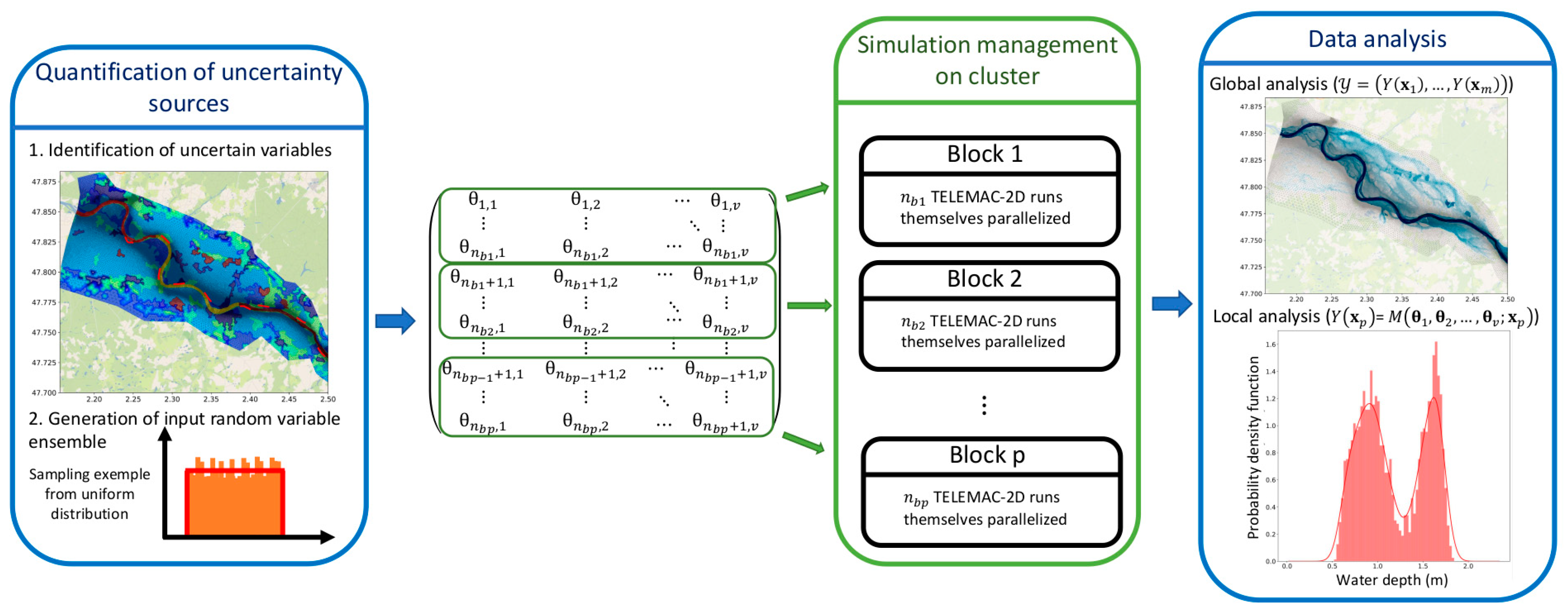
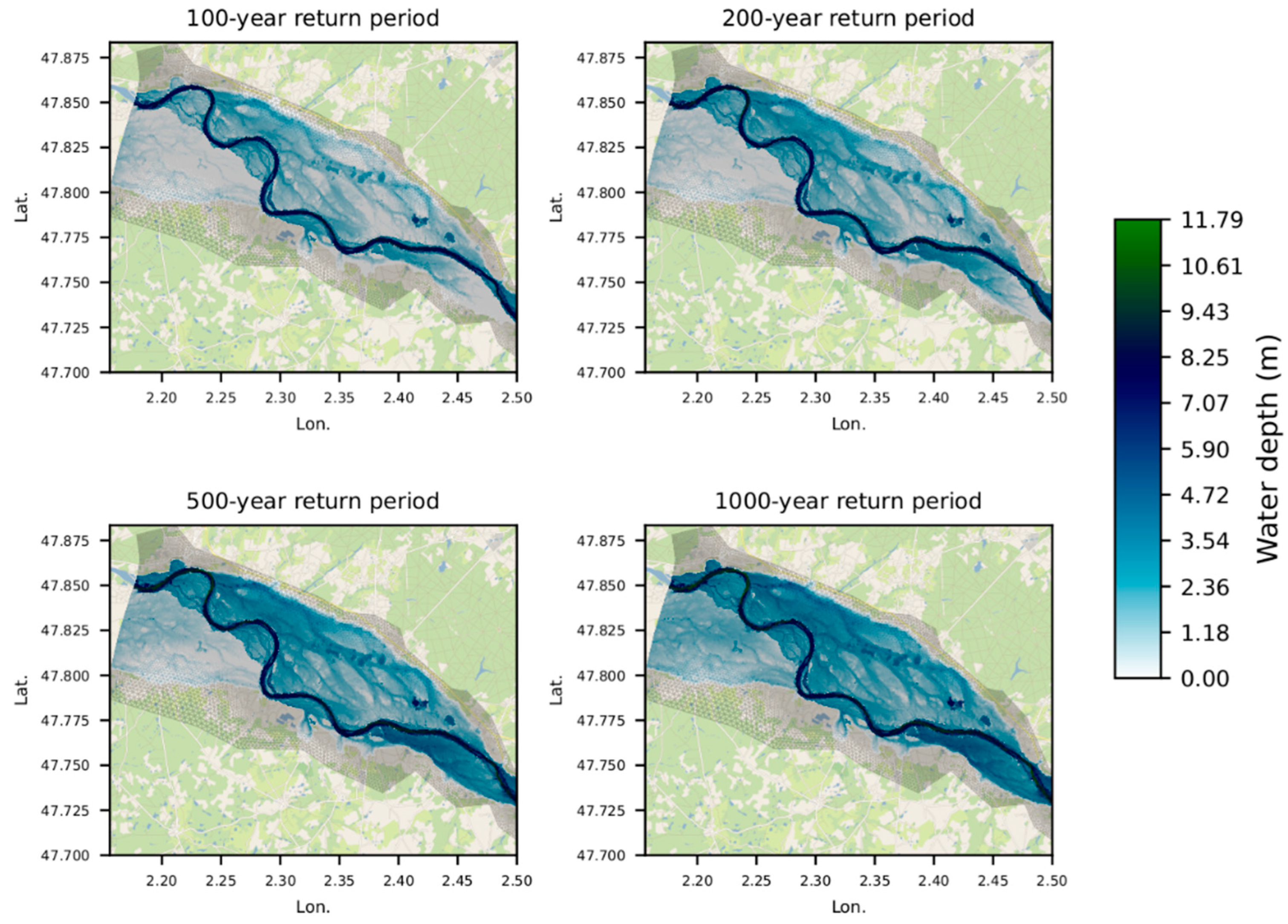
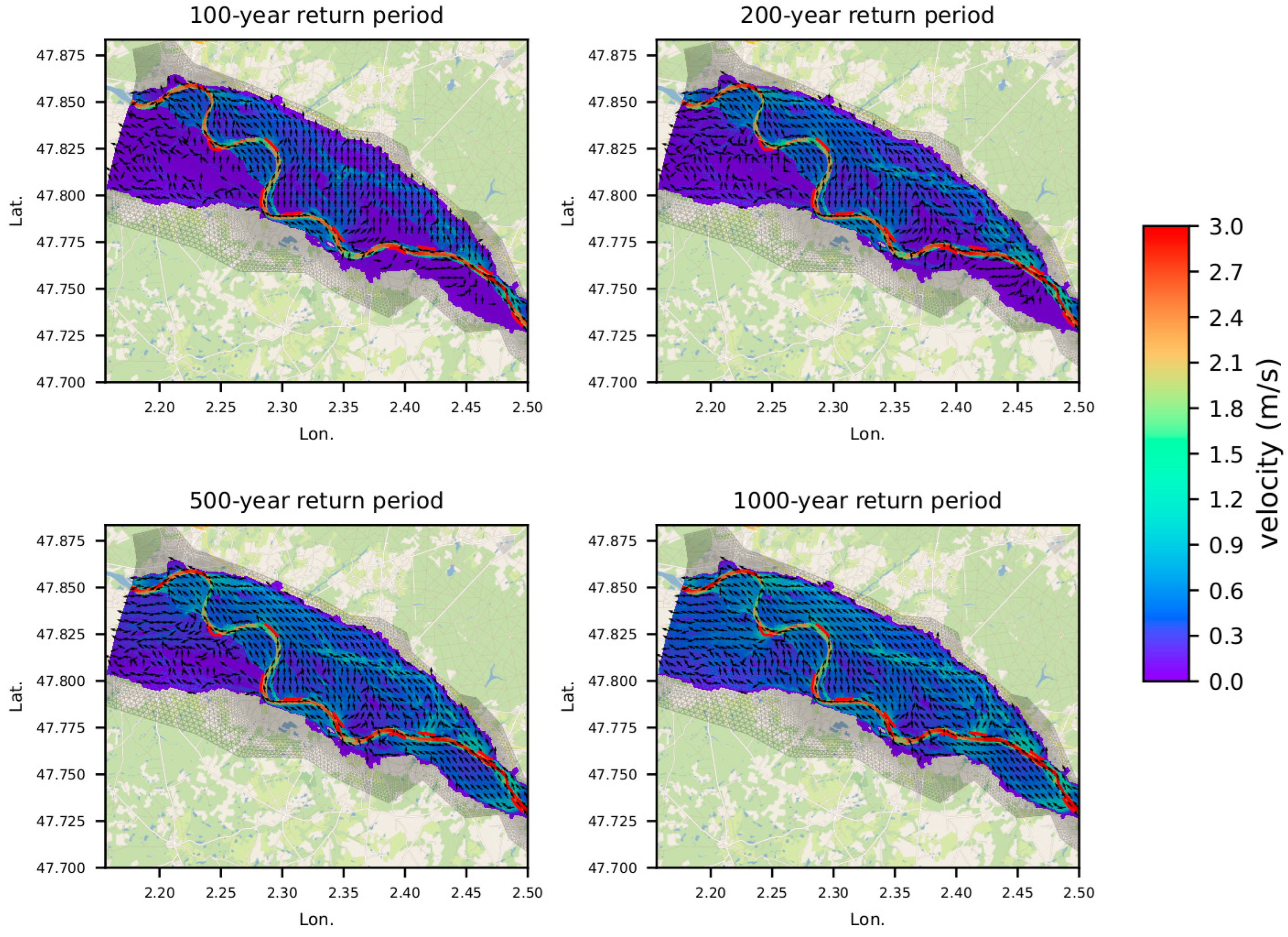
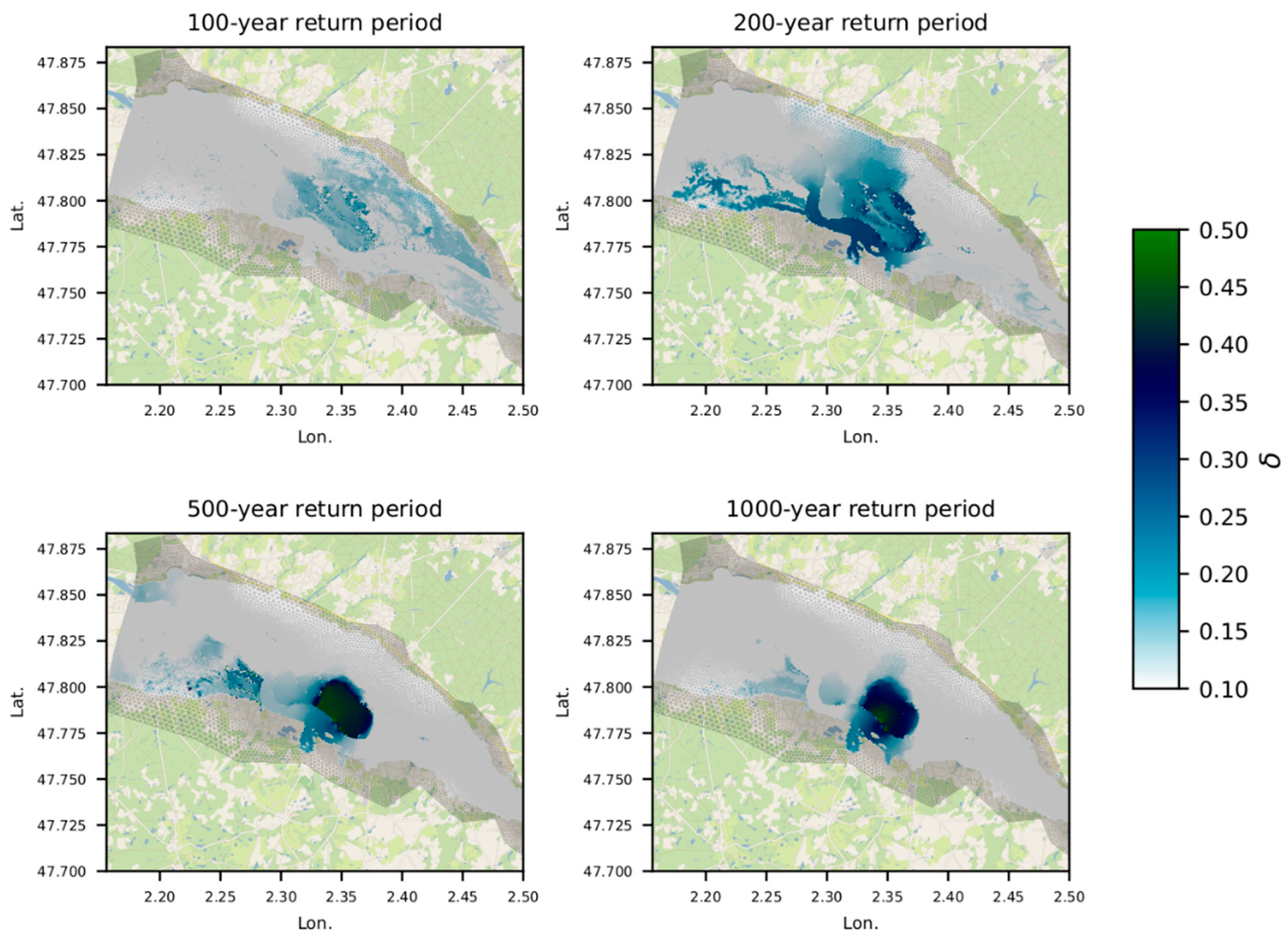
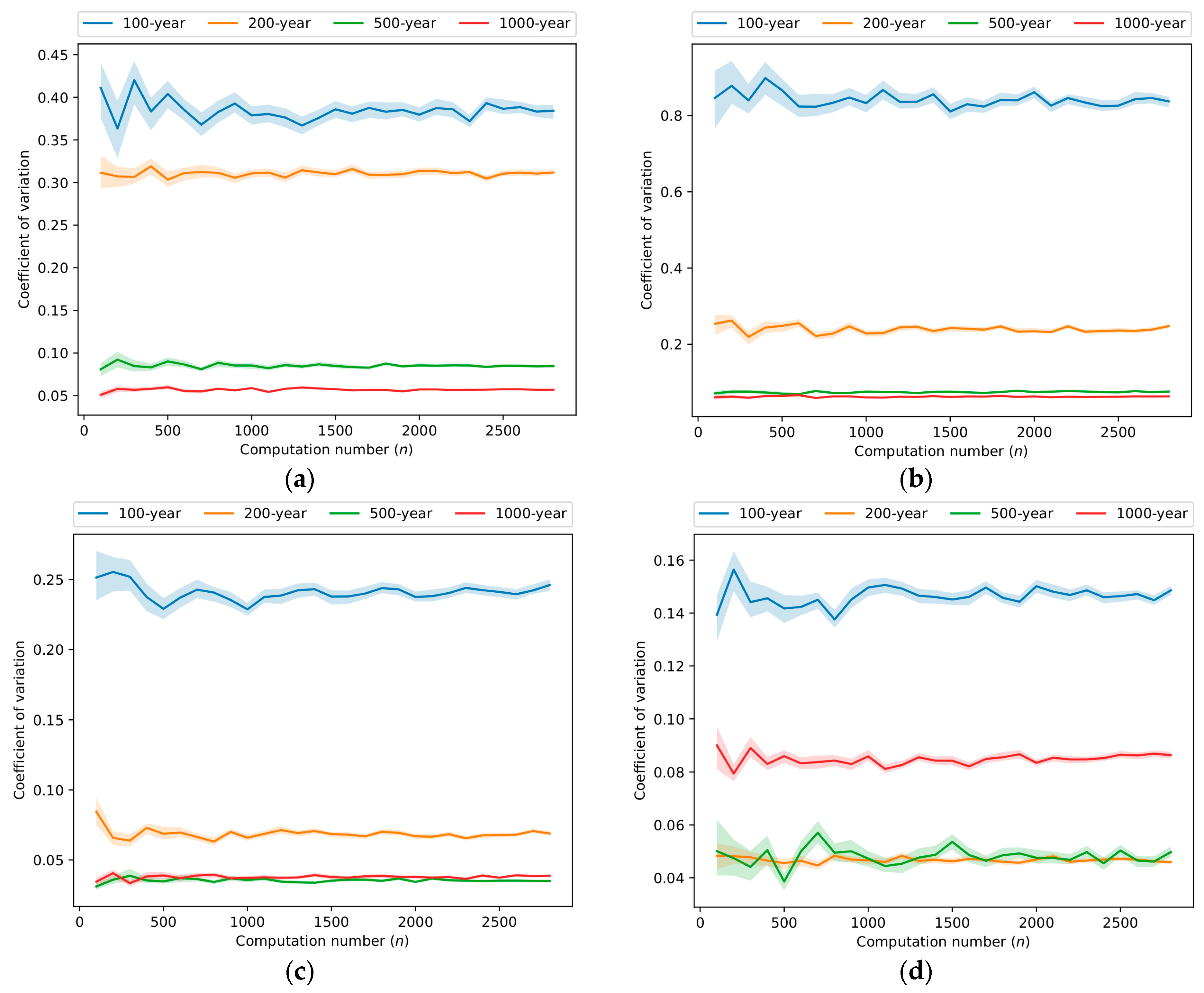
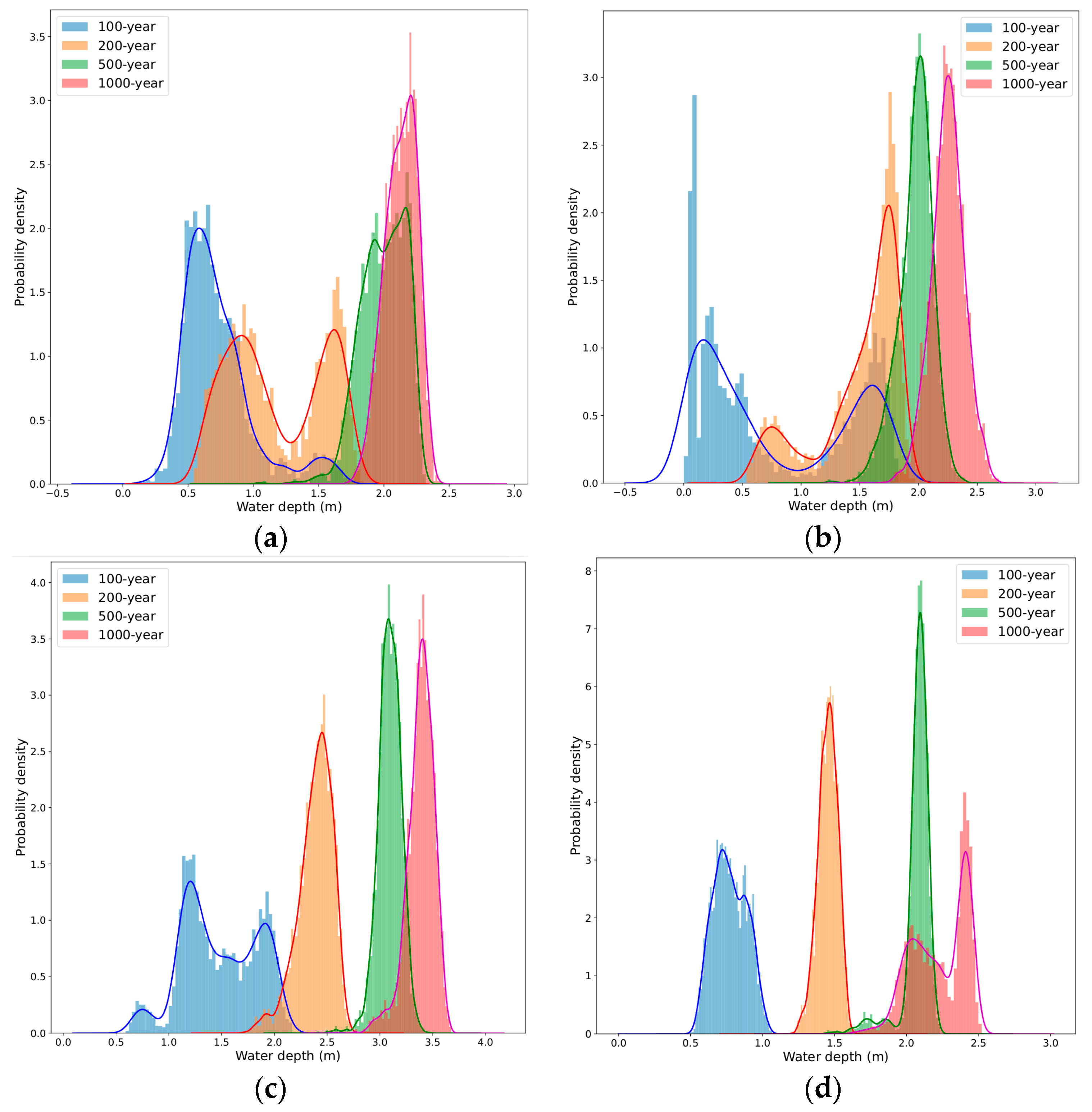
| Land Cover Class | Variation Interval (m1/3s−1) | Probability Distribution |
|---|---|---|
| Areas with dense urbanization | [5, 8] | Uniform |
| Areas with low urbanization | [8, 10] | |
| Areas of shrubs, undergrowth | [8, 12] | |
| Low-height agricultural areas | [10, 15] | |
| High-height agricultural areas | [15, 20] |
| Name | (m NGF N) | (m) | (m) | (m) | Dike Material |
|---|---|---|---|---|---|
| Fusible du déversoir | 120.80 | [−0.25, 0.3] | [0.3, 1.5] | [50, 850] | clay-dominated |
| Les ormes | 119.72 | [0.05, 0.6] | [0.3, 1.5] | [50, 950] | sandy-loamy |
| Embouchure de la Sange | 118.82 | [0.05, 0.6] | [0.3, 1.5] | [50, 950] | sandy-loamy |
| Saint-Père | 116.66 | [0.05, 0.6] | [0.3, 1.5] | [50, 950] | clay-dominated |
| Prouteaux | 115.60 | [−0.25, 0.3] | [0.3, 1.5] | [50, 950] | sandy-loamy |
| Bouteille | 114.46 | [−0.25, 0.3] | [0.3, 1.5] | [50, 950] | sandy-loamy |
| Les Boutrons | 112.08 | [0.05, 0.6] | [0.3, 1.5] | [50, 950] | sandy-loamy |
| Sigloy | 111.54 | [0.05, 0.6] | [0.3, 1.5] | [50, 950] | sandy-loamy |
| Control Points | Sully-Sur-Loire | Les Places | Les Boutrons | Le Mesnil |
|---|---|---|---|---|
| 100-years flood scenario | ||||
| 200-years flood scenario | ||||
| 500-years flood scenario | ||||
| 1000-years flood scenario |
| Methods | Borgonovo Indices | Permutation Importance |
|---|---|---|
| 100-years flood scenario | Saint-Père overtopping level: 0.22 ± 0.011 | Fusible du déversoir overtopping level: 0.73 ± 0.028 |
| Fusible du déversoir overtopping level: 0.20 ± 0.011 | Saint-Père overtopping level: 0.72 ± 0.024 | |
| PK403-414: 0.12 ± 7.2 × 10−3 | PK403-414: 0.33 ± 0.02 | |
| Saint-Père breach width: 0.10 ± 4.2 × 10−3 | PK414-420: 0.099 ± 6 × 10−3 | |
| Fusible du déversoir breach width: 0.091 ± 3.9 × 10−3 | Saint-Père breach width: 0.018 ± 1.4 × 10−3 | |
| FR-64977: 0.09 ± 4.3 × 10−3 | FR-64977: 0.0083 ± 6.9 × 10−4 | |
| 200-years flood scenario | Saint-Père breach width: 0.22 ± 9.9 × 10−3 | Saint-Père overtopping level: 0.91 ± 0.039 |
| Saint-Père overtopping level: 0.21 ± 0.011 | PK403-414: 0.57 ± 0.028 | |
| PK403-414: 0.13 ± 8.29 × 10−3 | Saint-Père breach width: 0.24 ± 9.7 × 10−3 | |
| Prouteaux overtopping level: 0.097 ± 6 × 10−3 | FR-64977: 0.081 ± 5.6 × 10−3 | |
| FR-64977: 0.083 ± 7.8 × 10−3 | Fusible du déversoir breach width: 0.045 ± 4 × 10−3 | |
| Fusible du déversoir breach width: 0.078 ± 7 × 10−3 | Prouteaux overtopping level: 0.01 ± 1 × 10−3 | |
| 500-years flood scenario | Saint-Père breach width: 0.32 ± 0.011 | Saint-Père breach width: 1.12 ± 0.042 |
| FR-65537: 0.1 ± 0.01 | FR-65537: 0.30 ± 0.018 | |
| Les Ormes overtopping level: 0.085 ± 7.02 × 10−3 | Prouteaux overtopping level: 0.14 ± 0.011 | |
| Prouteaux overtopping level: 0.081 ± 9.1 × 10−3 | Les Ormes overtopping level: 0.12 ± 0.01 | |
| PK403-414: 0.071 ± 7.65 × 10−3 | PK403-414: 0.048 ± 4.4 × 10−3 | |
| Les Ormes breach width: 0.058 ± 9 × 10−3 | Prouteaux breach width: 0.047 ± 5.8 × 10−3 | |
| 1000-years flood scenario | FR-65537: 0.22 ± 0.014 | FR-65537: 0.68 ± 0.028 |
| Saint-Père breach width: 0.19 ± 9.84 × 10−3 | Saint-Père breach width: 0.63 ± 0.023 | |
| Prouteaux overtopping level: 0.10 ± 0.012 | Prouteaux overtopping level: 0.23 ± 0.011 | |
| PK403-414: 0.098 ± 0.011 | PK403-414: 0.14 ± 6.2 × 10−3 | |
| Prouteaux breach width: 0.062 ± 9.55 × 10−3 | Prouteaux breach width: 0.10 ± 8.4 × 10−3 | |
| Les Ormes breach width: 0.054 ± 7.1 × 10−3 | Les Ormes breach width: 0.08 ± 8.9 × 10−3 |
Publisher’s Note: MDPI stays neutral with regard to jurisdictional claims in published maps and institutional affiliations. |
© 2022 by the authors. Licensee MDPI, Basel, Switzerland. This article is an open access article distributed under the terms and conditions of the Creative Commons Attribution (CC BY) license (https://creativecommons.org/licenses/by/4.0/).
Share and Cite
Goeury, C.; Bacchi, V.; Zaoui, F.; Bacchi, S.; Pavan, S.; El kadi Abderrezzak, K. Uncertainty Assessment of Flood Hazard Due to Levee Breaching. Water 2022, 14, 3815. https://doi.org/10.3390/w14233815
Goeury C, Bacchi V, Zaoui F, Bacchi S, Pavan S, El kadi Abderrezzak K. Uncertainty Assessment of Flood Hazard Due to Levee Breaching. Water. 2022; 14(23):3815. https://doi.org/10.3390/w14233815
Chicago/Turabian StyleGoeury, Cédric, Vito Bacchi, Fabrice Zaoui, Sophie Bacchi, Sara Pavan, and Kamal El kadi Abderrezzak. 2022. "Uncertainty Assessment of Flood Hazard Due to Levee Breaching" Water 14, no. 23: 3815. https://doi.org/10.3390/w14233815
APA StyleGoeury, C., Bacchi, V., Zaoui, F., Bacchi, S., Pavan, S., & El kadi Abderrezzak, K. (2022). Uncertainty Assessment of Flood Hazard Due to Levee Breaching. Water, 14(23), 3815. https://doi.org/10.3390/w14233815






